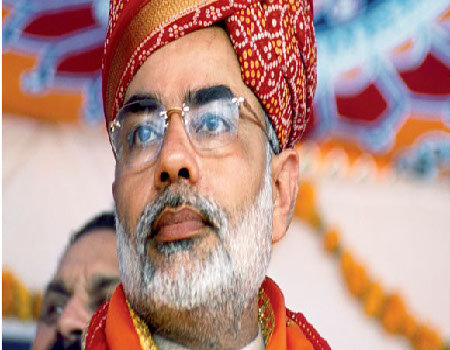 Narendra Modi’s deputy during the Godhra train incident and the subsequent riots has admitted before the Nanavaty Commission that it was Modi’s decision to bring the Godhra victims to Ahmedabad.
Narendra Modi’s deputy during the Godhra train incident and the subsequent riots has admitted before the Nanavaty Commission that it was Modi’s decision to bring the Godhra victims to Ahmedabad.
By RK Misra
The former Gujarat minister of state for home Gordhan Jhadaphia admitted before the Nanavaty-Mehta judicial inquiry commission probing the Godhra train carnage that he believed that the decision to bring the bodies to Ahmedabad was taken by Chief Minister Narendra Modi and then health minister Ashok Bhatt who was at the site.
Facing cross-examination before the commission on Friday, Jhadapia said he had come to know about the decision only later on. He denied the Gujarat government’s claim that the decision to bring the bodies to Ahmedabad was taken because most of the victims belonged to the city. He made it clear that when the decision was taken to bring the bodies to Ahmedabad, most of them remained unidentified and there was no way to know that they belonged to any particular city.
He also made it clear that he had not asked the then urban development minister I K Jadeja to sit in the office of the state director general of police on the day of the “Gujarat bandh” on February 28, 2002.
Replying to questions before the panel probing the Godhra train carnage and the post-Godhra communal riots in the state in 2002, Jhadaphia refuted Jadeja’s claim that he was sitting in the DGP’s office at the instance of the then minister of state for home.
“I did not issue any such instruction to Mr Jadeja and I do not know who had asked him to stay put at the DGP’s office,” Jhadaphia stated.
Jadeja has been facing flak for having taken control of the DGP’s office to supervise the movement of police deployment on the day in question. Jadeja had earlier told the commission that he did so at the instruction of Jhadaphia. Jadeja had also claimed that he was asked by Jhadaphia to sit in the DGP’s office only to clear the communication gap between the police and the state government.
The former minister of state for home said that during the period he had independent charge of only border security and police housing while all other issues related to the home ministry including internal security were vested with Chief Minister Narendra Modi who also held the home portfolio.
Jhadapia made it clear that he had no knowledge about the state government’s decision to bring the bodies of the train carnage victims to Ahmedabad.
Jhadaphia created a stir of sorts when he refused a ministerial offer from Modi. Subsequently he quit the BJP after he developed serious differences with the Chief Minister and formed his own Mahagujarat Janata Party just before the 2007state Assembly elections. He, however, pointed out that he did not believe that bringing the bodies to Ahmedabad had incited a flare up leading to the communal carnage.
Jhadapia said he had no knowledge of the chief minister having convened a high-level meeting of police officers on the night of February 27, 2002, and two more meetings on the subsequent day, but clarified that no instruction was issued by the government then to the police to go soft on the Hindu rioters as alleged.
Jhadaphia also refuted the claims of the controversial IPS officer Sanjiv Bhatt that as the deputy commissioner of the state intelligence branch then he had kept him informed about the bandh call given by the Vishwa Hindu Parishad and its possible repercussions and the mob violence in various places of Ahmedabad. “I had never received any fax message from Ashok Bhatt on these matters,” he said.
Jhadaphia disagreed that he was in constant touch with some of the riot accused like Bipin Panchal and Jaideep Patel, both leaders of the VHP, or Babu Bajrangi of the Bajrang Dal on February 28 and later.
Jhadaphia also said that it was not his decision to take away the charge of Ahmedabad police commissioner from PC Pandey about a month after the riots, nor did he play any role in the transfer of some of the competent police officers who had prevented the outbreak of any violence in their respective areas.
